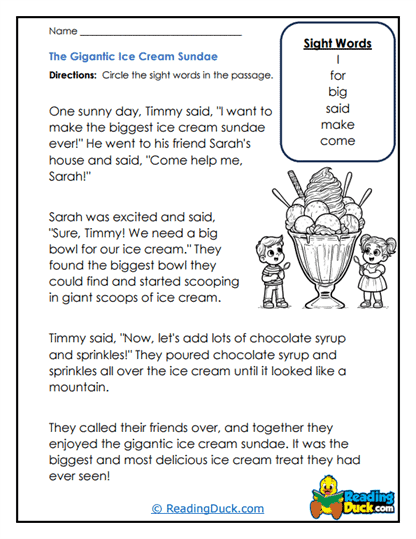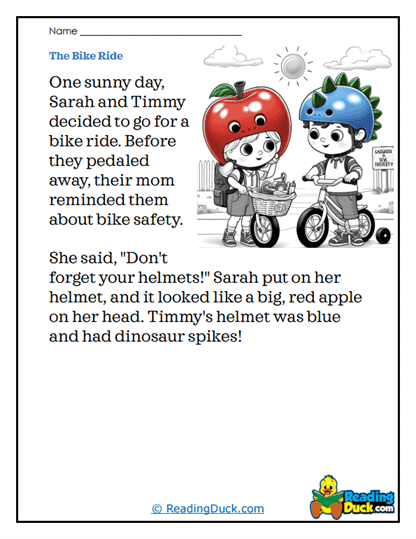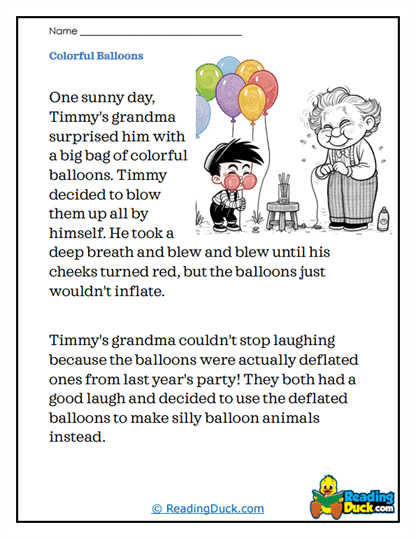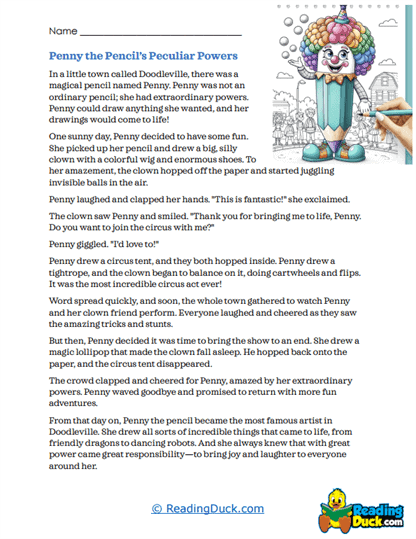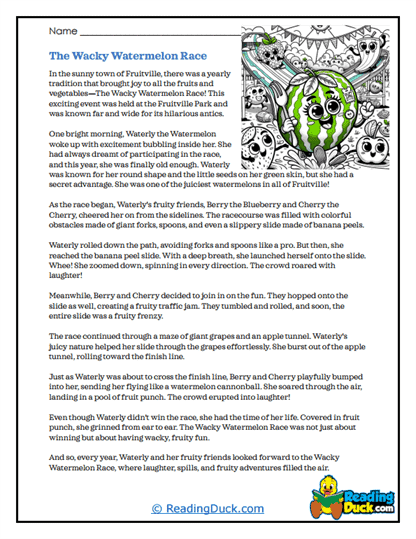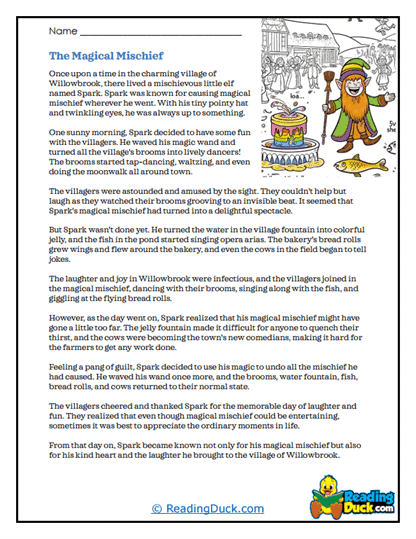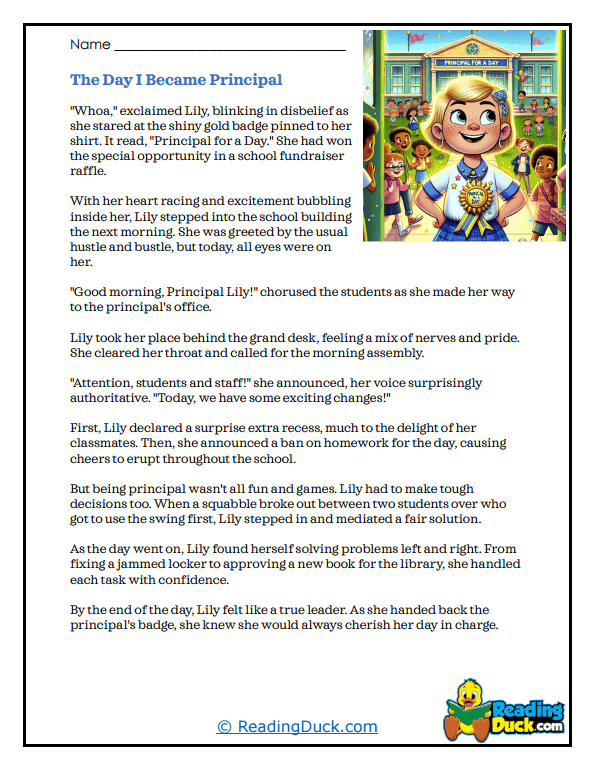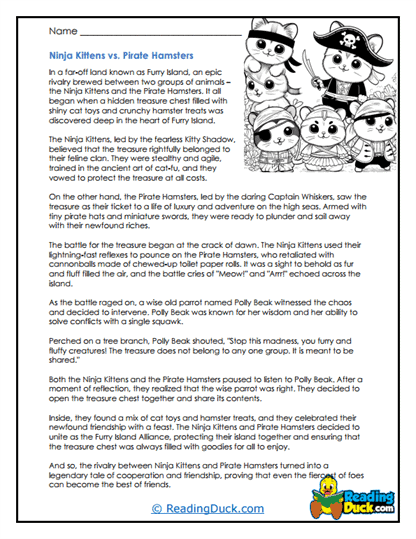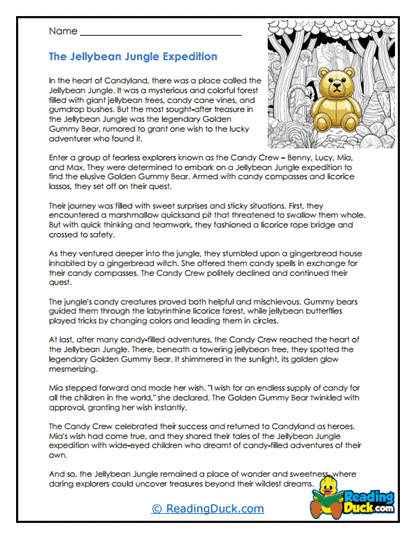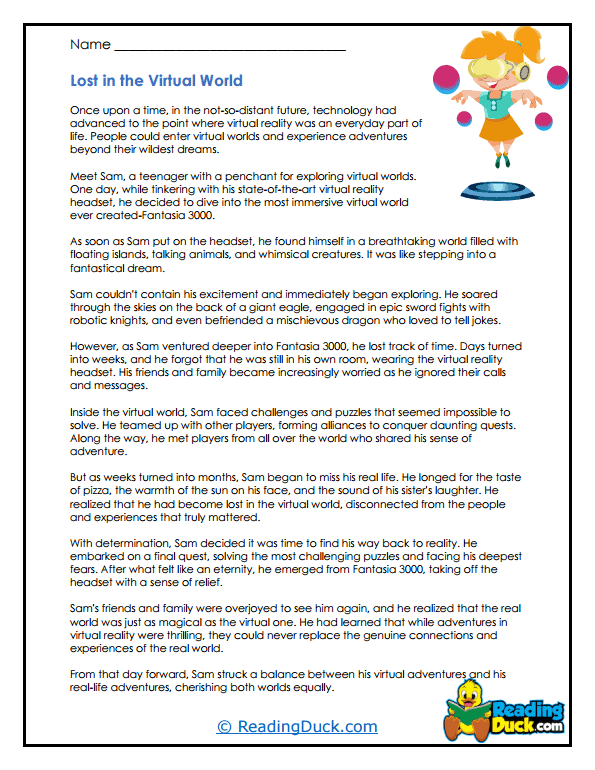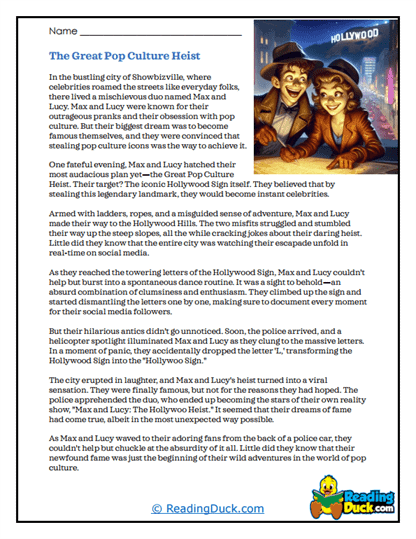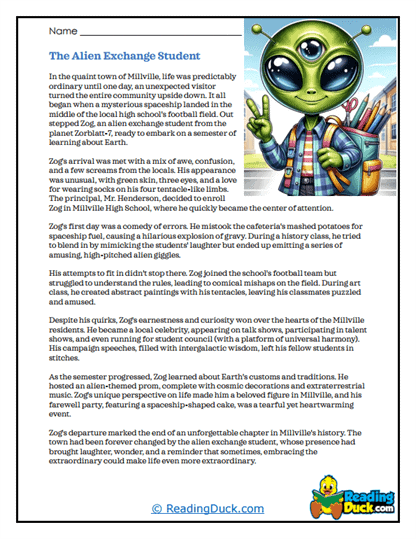Grade Level Worksheets
About Our Grade Level Worksheets
Our Grade Level Worksheets are designed to provide students with age-appropriate reading passages, accompanied by engaging and relevant images to enhance their learning experience. Each worksheet set features a carefully crafted reading passage that aligns with the reading level of the grade, followed by comprehension questions designed to test understanding. These questions include:
- Multiple-choice questions to assess basic comprehension and recall of facts from the text.
- Short answer questions that require students to summarize or explain key points in their own words, encouraging deeper engagement with the material.
- Open-ended response questions that challenge students to analyze and reflect on the passage, promoting critical thinking.
Every worksheet includes a downloadable answer key, simplifying the grading process for teachers and parents. The worksheets are available in PDF format, making them easy to download, view, and print, whether for classroom use or home study. This flexibility allows educators and parents to seamlessly incorporate these worksheets into any learning environment, providing a valuable tool for reading comprehension practice at every grade level.
Benefits of Grade Level Worksheets for Students
Grade Level Worksheets offer tailored content for each developmental stage, ensuring that students master reading skills appropriate for their age and ability. These worksheets cater to the unique learning needs of each grade, from foundational literacy in early grades to advanced comprehension in high school.
- Preschool: Early learners begin to explore letter recognition, basic phonics, and simple sentence structure. Worksheets for preschoolers focus on developing familiarity with letters, words, and sounds, which are essential for early reading success.
- Kindergarten: At this stage, students continue to build on their phonics skills and begin practicing simple sentence reading. The worksheets reinforce letter-sound relationships and introduce simple sight words to strengthen word recognition.
- Grades 1-3: In the early elementary years, students focus on improving fluency, decoding skills, and comprehension. Worksheets for these grades include short passages that help children practice reading complete sentences, answer simple comprehension questions, and improve their understanding of basic story elements.
- Grades 4-6: As students enter upper elementary grades, they are introduced to more complex texts, requiring them to analyze main ideas, details, and vocabulary. These worksheets encourage students to draw inferences, summarize texts, and develop deeper comprehension of fiction and nonfiction passages.
- Grades 7-9: Middle school worksheets challenge students with longer, more challenging texts. These worksheets require students to interpret figurative language, identify themes, and analyze characters and plot development, helping to prepare them for high school-level reading.
- Grades 10-12: High school worksheets target advanced comprehension and text analysis. These passages often involve complex language, abstract themes, and literary devices. Students are encouraged to interpret symbolism, analyze the author’s purpose, and evaluate argumentative or persuasive texts, developing skills necessary for college-level reading and writing.
By aligning each worksheet set with grade-specific reading levels, these worksheets support literacy development in a structured way, ensuring that students continue to progress in their reading comprehension abilities as they advance through school.
Tracking Student Progress with Grade Level Worksheets
One of the key benefits of our Grade Level Worksheets is their ability to help track student progress over time. These worksheets provide targeted practice in specific areas, allowing educators and parents to monitor a child’s growth in reading comprehension and related skills. Regular use of these worksheets can reveal areas where students excel and where additional support may be needed.
- Identifying strengths and weaknesses: By reviewing students’ responses to the comprehension questions, teachers and parents can determine which reading skills students have mastered and which areas need more attention.
- Tracking improvement over time: Regular use of grade-level worksheets helps educators track students’ reading development throughout the school year. By comparing performance on multiple worksheets, teachers can see how students' comprehension skills evolve and improve.
- Providing individualized support: If a student struggles with a particular aspect of reading, such as making inferences or understanding vocabulary, teachers can use these worksheets to provide additional practice in those specific areas.
These worksheets serve as a valuable tool for both formative and summative assessments, giving educators and parents insights into a child’s reading progress and allowing them to adjust instruction or practice as needed to ensure continued growth.
Adaptability for Various Learning Environments
Our Grade Level Worksheets are designed for use in a wide variety of educational settings, from traditional classrooms to homeschooling and independent study. Their flexibility makes them an ideal resource for teachers and parents alike.
- Classroom use: Educators can incorporate these worksheets into their lesson plans as independent practice, group work, or homework assignments. The worksheets can be used to reinforce reading skills, introduce new concepts, or provide targeted practice for struggling readers.
- Homeschooling: For parents teaching their children at home, these worksheets provide a structured and effective way to ensure their child is working at the appropriate grade level. Parents can use the worksheets to supplement their reading curriculum and track progress over time.
- Independent study: The worksheets are also ideal for independent learners who need additional reading practice outside of the classroom. Students can work through the passages and questions at their own pace, building reading comprehension skills independently.
The adaptability of these worksheets ensures that they can be easily integrated into any educational setting, providing consistent and reliable reading comprehension practice.
Suggestions for Parents to Support Learning at Home
Parents play a critical role in supporting their child’s literacy development, and Grade Level Worksheets offer a simple yet effective way to reinforce reading skills at home. Here’s how parents can use these worksheets to enhance their child’s learning:
- Reinforce school learning: Parents can use the worksheets to provide additional practice on topics covered in school, helping their children solidify their understanding of key concepts and reading skills.
- Provide extra practice: For children who may be struggling in certain areas, such as understanding vocabulary or making inferences, parents can use these worksheets to offer focused practice and support.
- Monitor progress: By regularly reviewing completed worksheets, parents can track their child’s progress and identify any areas where additional help may be needed.
Using these worksheets at home ensures that learning continues outside the classroom and gives parents a clear way to stay engaged in their child’s academic progress.
Assessing Comprehension with Grade Level Worksheets
Grade Level Worksheets are an excellent resource for teachers to assess students' reading comprehension and related skills. The variety of question types included in each worksheet allows for a thorough evaluation of how well students understand the material.
- Multiple-choice questions: These questions offer a quick and clear way to gauge basic comprehension and ensure that students are able to recall key details from the passage.
- Short answer questions: By requiring students to summarize or explain in their own words, short answer questions assess their ability to process and interpret the text.
- Open-ended questions: These questions are designed to encourage deeper thinking, prompting students to analyze themes, characters, and ideas in the passage. Open-ended responses give teachers insight into students' critical thinking and ability to engage with the text on a more analytical level.
By reviewing students’ answers to these questions, teachers can identify gaps in knowledge and understanding, which can then be addressed in future lessons. These worksheets also serve as effective formative assessments, helping teachers tailor their instruction to meet individual student needs.
Conclusion
Our Grade Level Worksheets offer a comprehensive and flexible tool for helping students develop and strengthen their reading comprehension skills at every stage of their academic journey. With age-appropriate reading passages, multiple-choice questions, short answer prompts, and open-ended questions, these worksheets are designed to support literacy development from preschool to high school.
Whether used in classrooms, homeschooling settings, or independent study, Grade Level Worksheets provide educators and parents with a valuable resource to track student progress, address areas needing improvement, and ensure students are mastering essential reading skills. These worksheets not only promote comprehension but also encourage critical thinking, making them an indispensable part of any reading curriculum.
